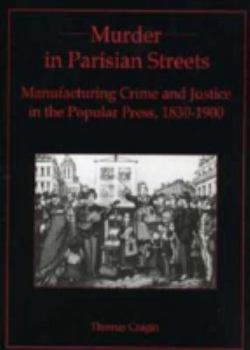Murder in Parisian Streets: Manufacturing Crime and Justice in the Popular Press, 1830-1900
Paris has long stood at the center of French social and political life, but its redesign in the middle of the nineteenth century also made it the capital of European modernization. It was the focal point of dramatic cultural change, yet its largest circulating media continued to emphasize the same kind of news it had since the dawn of printing: murder. The most important of France's news genres, for both its immediate popularity and long-term influence, was the canard. The canards were cheap broadsheets and booklets that most often reported sensations, particularly murders. Made by members of the working and lower-middle classes and sold with great success to a vast and diverse audience, the canards deeply influenced and appealed to popular understandings of crime and punishment. Despite their importance in their day and their value to cultural studies, historians have paid them scant attention. In Murder in Parisian Streets Thomas Cragin provides an in-depth study of the production, sale, and content of the canards. He demonstrates their significance to nineteenth-century culture, even their role in determining the emerging tabloid's success. Cragin explores the incremental creation of textual meaning in the canards authorship, production, distribution, and consumption. He exposes the power of oral traditions as well as modern marketing at work upon this popular news literature. The canards challenge our assumptions about the nineteenth century's revolution in print and reorient our understanding of cultural creation through textual construction.
Format:Hardcover
Language:English
ISBN:1611482062
ISBN13:9781611482065
Release Date:September 2006
Publisher:Bucknell University Press
Length:273 Pages
Customer Reviews
0 rating





